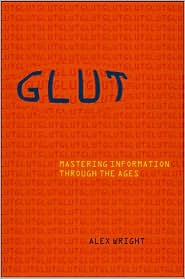Sunday, August 30, 2009
Review of Glut
Glut by Alex Wright is basically about how people have categorized information throughout the ages, with an emphasis on how libraries have traditionally organized information. Overall while there were a few interesting bits of information that I gleaned from it, the book was too broad for me to really find interesting or useful. Except for a few passing references the book was also largely biased towards western Europe, and once the timeline got around to the birth of the United States, it was largely biased towards America.
One part that I did find interesting, however, was the part discussing the monastic art of memory and specifically the difference between memorizing facts and actual wisdom. To me it seems like this is one major way that the internet has changed learning. I'm too young to know what the education system was like before computers firsthand, but based on books that I've read written in previous decades or the past century it seems like the modern education system puts a lot less emphasis on memorizing by rote and more emphasis on analyzing information. Maybe this is partly due to the fact that we're in the "information age" so that it would be impossible to memorize everything that a person needs to know just to get along today. It's probably also partly due to the fact that it's so easy to look up information now that there's no need to memorize it. Recently when I've been hanging out with my friends and one of us can't remember something someone will just whip out their i phone and look up the answer immediately. Tools like Wolfram Alpha are making it even easier to look up basic facts. I know I've had teachers who have said something to the effect of "Don't bother memorizing the dates--you can look those up on wikipedia. I want you to be able to tell me the event's significance instead."
I think one of the most beneficial aspects of the internet is that it puts a whole lot of facts at your fingertips so that you don't have to memorize information. Now you can spend the time that you previously had to spend in memorizing something or looking something up drawing connections and thinking critically about the information instead. I think that libraries play an important role in this. I almost never see people use encyclopedias or dictionaries anymore because it's easier to look up basic facts online. Where the internet can often be lacking, however, is in intelligent analysis of those basic facts, and with more information available every day I think people need more help to make sense of all of it. This is where I think libraries can really help by providing books and articles that have gone through some sort of publishing or peer-review process to ensure its accuracy. What I've noticed in student presentations is that students have more information readily available, but they often have difficulty distinguishing the good information from the bad. (In one of my theatre history classes I remember a student got in an argument with my teacher when the teacher objected to her claim that there were cars in the Elizabethan period. She kept on pointing to some pages printed from the internet saying--"it's written right here!")
Overall I'd give this book a 3 out of 5 stars. If you know almost nothing about the subject, it might be a good introduction, but it was much too general for me.
Subscribe to:
Post Comments (Atom)

No comments:
Post a Comment